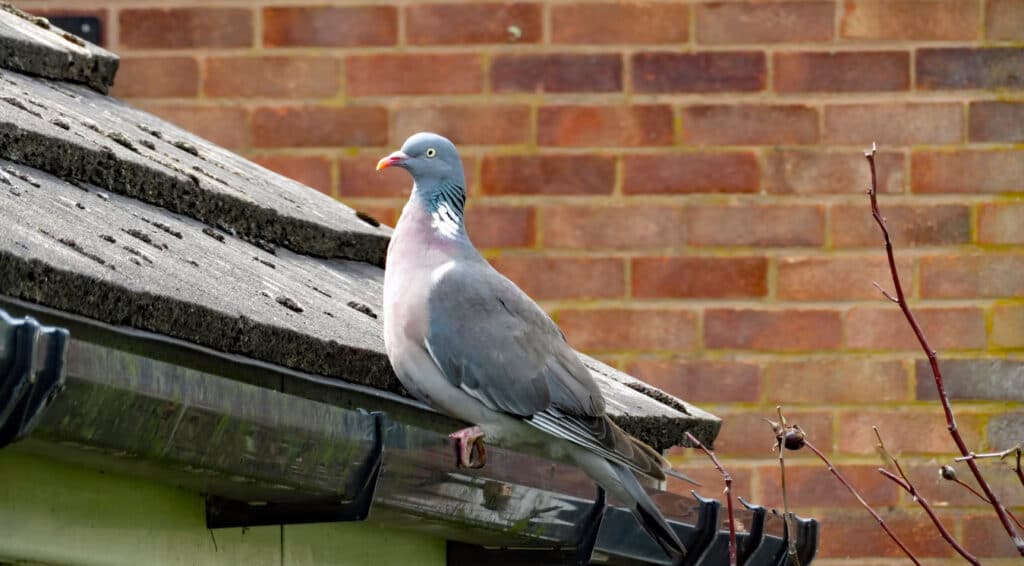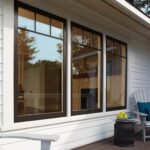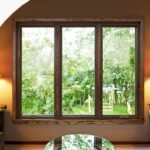Large cities and their surroundings are developing by the day, moving the wildlife from their natural habitat. Bird species have learned to benefit from human habitation by taking advantage of the newly built spaces.
Consider secluded places like gutters, home ledges, etc., as suitable for building nests and raising their chicks. Birds are fun to have in your yard, but the story changes when they decide to nest in your gutters.
Birds nesting in your downspouts can be a problem and an added expense. However, there are ways you can prevent birds from nesting in your gutters. For reasons why they nest in downspouts to the prevention options, keep reading for more details.
Table of Contents
How to Keep Birds from Nesting on Downspouts
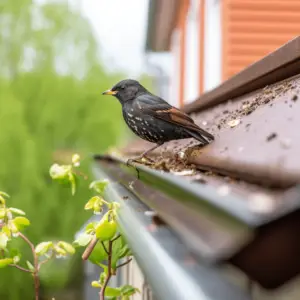
There are various reasons why birds choose gutters as an ideal place to build nests, such as:
Safety – Birds like hidden places for their hatchling safety and protection from predators.
Shelter – Flying is considered a plus over predators, but predatory birds can always access the nests from above. Therefore, the parent birds ensure that the nest is well hidden to offer maximum protection to the hatchlings from potential threats.
Less work– some birds like house sparrows take advantage of hollow areas in roofs or drainages to form their nests. Though they may require some lining, it is less work than making a nest from scratch.
Food source– Birds feed on insects. Packed leaves and humidity in the drainage make an ideal environment for insects to thrive. The parents will find food for their hatchlings closer and in any place near food other than the gutters.
Why is nesting in Downspouts Problematic?
The primary role of effective gutters is to funnel water from the roof to other home vicinities. When there is a lack of attention, they may be compromised, causing severe damage such as:
Health risk – Birds carrying parasites like mites survive long even after the host leaves and thrive in unfavorable environments. They might pose a threat of infectious disease, although their saliva causes skin irritation which, when scratched, causes secondary infections.
Birds like pigeons are associated with the spread of airborne diseases like Cryptococcosis.
Bird droppings – The droppings are unsightly, but they cause irreversible damage to the drainages due to the acidity that catalyzes the rusting of metals. They eat the protective paint leaving them exposed to rain and the sun.
Clogging – Birds use twigs, feathers, dirt and other debris to make the nests, causing a blockage in the gutters. The clogging obstructs the water leading to flooding issues and rots in your roof’s wood components like the fascia board.
Clogging can also cause your home’s exterior moisture damage due to the spilling water; due to the blockage, the water misdirects to the drainage.
Damaged foundation and cracked basement walls- When the control of the diverted water is not adequate from the roof to the foundation, cracks form on your basement wall and a shift on the foundation. Soil deformation is due to the water saturation in the soil, leading to its swelling, and when the water dries up, the soil sink affects your home foundation.
Measures to Keep Out Birds from Nesting in Your Downpipe
Did you know that the federal law protects the bird species in North America? It is illegal to disturb, kill or trap certain bird species. It is more important than to keep the birds from nesting in your gutters, and here is how you can pull that effortlessly.
Bird deterrent/Decoys:
Birds won’t approach your gutters if they perceive there are predators closer. Dummies like fake owls, terror eyes, rubber snakes, etc., will visual scare the birds away but be cautious that they don’t fall into the gutter and cause blockage. However, it is a short term option.
Ultrasonic bird repellers:
Unlike the conventional bird repellers, whose sound mimics might cause disturbance to the neighbors, Ultrasonic bird repellers produce sounds that the birds can only hear. The only shortcoming is that they are pricey and need constant maintenance.
Gutter covers:
The use of gutter guards is cost-effective, secures your downspout from birds and leaves, and is compatible with several gutter systems, thus lessening the maintenance needs.
Bird repellent:
The bird spray/gel contains sticky, slippery, or sticky substances when put on a surface, making it unfavorable for the birds to stay inside your gutter. The repellent is cost-effective, but it requires frequent reapplication. Choose the non-toxic and biodegradable ones to reduce health and environmental risks.
Fit bird spikes:
They are long needle-like rods that prevent birds from landing on your roof and building nests in your drainage. Anti-roosting spikes don’t harm the birds but make a surface impossible for them to land. During installation, they are costly and time-consuming but the most reliable and durable deterrent.
Gutter helmet:
Directs water flow to your gutters by surface tension, keeping leaves and other debris out. The installation of the helmet uses heavy-duty brackets to prevent the gutter guards from dislodging by birds. It is weather resistant.
Bird netting:
prevent birds from invading areas in your home like gutters and even chipping away your crops. They are available in various types and prices to select as per your needs.
Get rid of inactive nests:
By hand, you can remove the nest and not during the breeding season to avoid loggerheads with the authorities. Ensure to wear sleeve gloves and respiratory protection.
Comprehensive downspout cleaning:
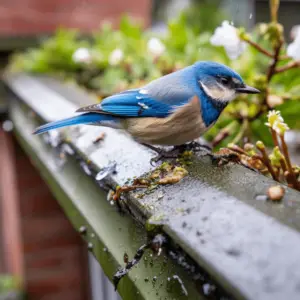
Debris draws birds and gives them accessible materials for building nests and harbors insects that are their food source. Remove all the leaves and dirt using a plastic scoop/spatula and clean thoroughly. You can involve a professional to assist you with the process.
Downspouts provide a lofty and sturdy site for Birds to build their nest because of the proximity to food and building materials. The nests, in turn, provoke blockages and other vital damages to the property and your health.
However, remove the empty nests only because destroying the bird nests during the spring season is against the law. Therefore, it is highly recommendable that you keep them away from nesting by implementing the measures discussed herein.
